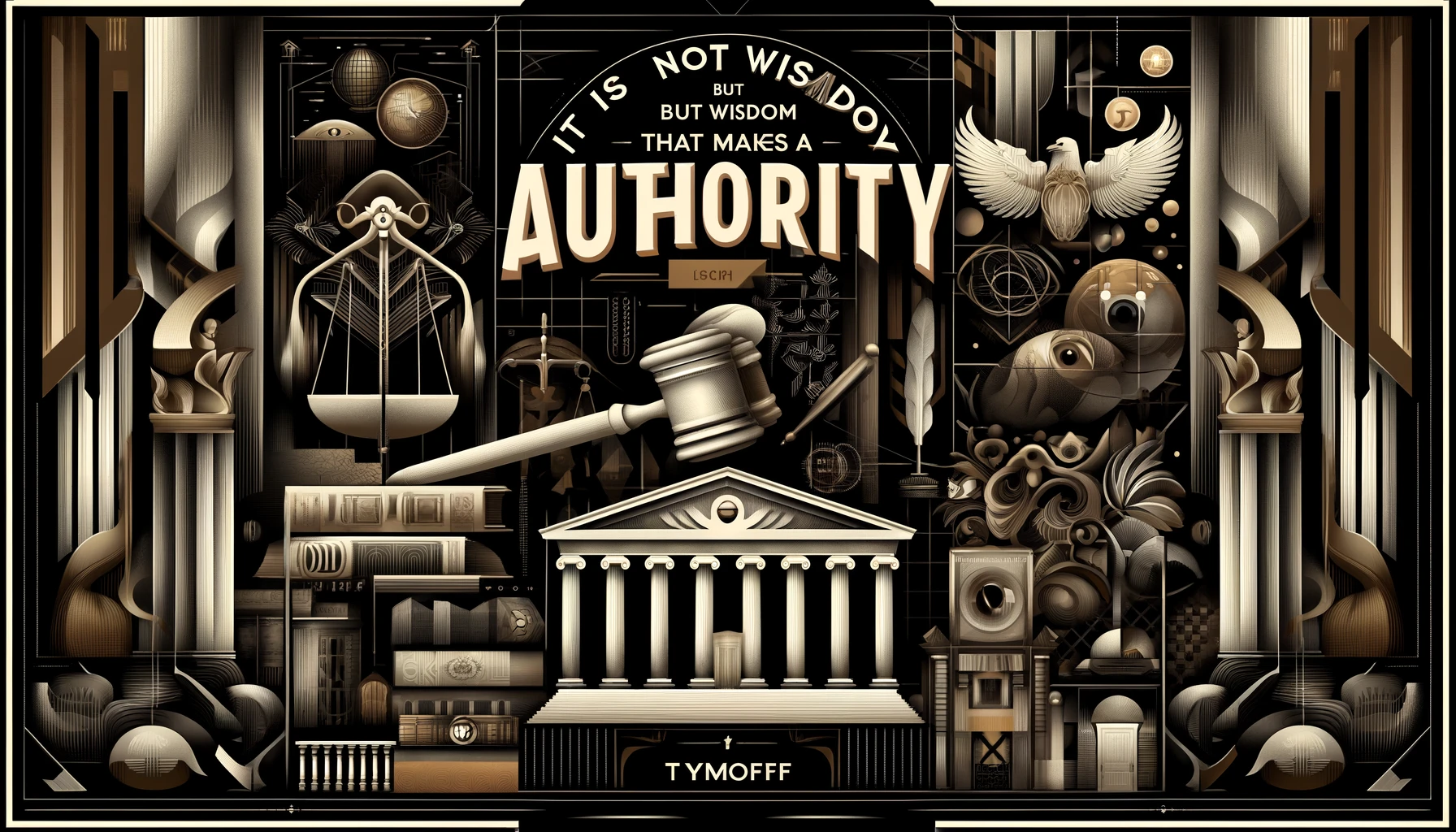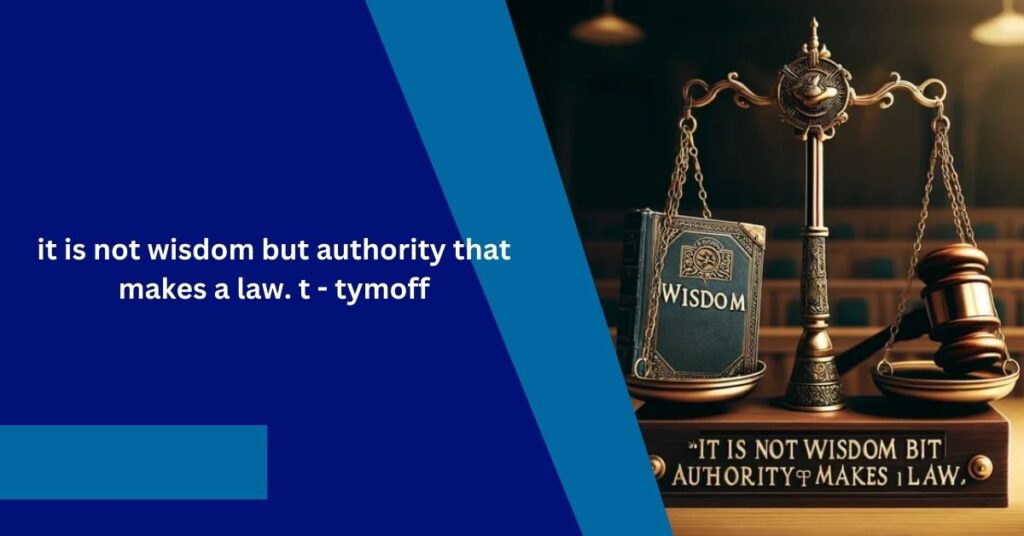Introduction to the Concept
T. Tymoff’s assertion, “it is not wisdom but authority that makes a law. t – tymoff,” presents a compelling argument that has significant implications on the perception of lawmaking. At its core, this statement emphasizes the distinction between wisdom and authority in creating legal frameworks. While wisdom is traditionally associated with sound judgment, deep understanding, and experience, authority is inherently linked to power, governance, and enforcement. In the legal context, authority serves as the definitive force behind the establishment of laws, suggesting that it is not merely the rational or moral quality of legislative decisions that gives them legitimacy, but rather the power of the body that enacts them.
The essence of Tymoff’s perspective lies in recognizing that laws are not necessarily products of collective wisdom or ethical considerations. Instead, they emerge from structures of authority that possess the capacity to impose rules and dictate behavior through established protocols. The implications of this understanding are profound, particularly when analyzing how laws are created, maintained, and enforced. It suggests a critical inquiry into the legitimacy of laws and the institutions behind them, prompting discussions regarding the potential disconnect between legal authority and moral reasoning.
In contemporary societies, the reliance on authoritative structures can lead to laws that reflect the interests of those in power rather than the common good. This phenomenon creates an opportunity for critical examination of the balance between authority and wisdom within legal systems. As we explore the dynamics posed by Tymoff’s assertion further, we will delve into historical and contemporary examples that illustrate the practical applications of authority in lawmaking. Understanding this distinction is crucial for anyone seeking insight into the foundations of legal systems and the roles that power dynamics play in the governance of society.
Defining Authority in Law
Authority within the context of legal systems refers to the power or right to create, enforce, and interpret laws. This concept is essential in understanding how laws function in society and their implications for justice, governance, and order. Various sources contribute to the establishment and validation of legal authority, which fundamentally shapes the structure of legal frameworks.
One primary source of authority is government institutions, such as legislatures, courts, and administrative bodies. These entities are vested with the power to formulate laws, adjudicate disputes, and implement legal provisions. Their authority is often derived from the constitution or foundational legal documents that outline their roles and powers within a specific jurisdiction. For instance, a legislature may introduce statutory laws that govern social conduct, while courts possess the authority to interpret these laws and apply them to individual cases, thus reinforcing the legal structure.
Additionally, legal precedents play a significant role in defining authority. Judicial decisions made by courts in previous cases can establish binding rules or principles that guide future conduct. This system of precedent, known as stare decisis, ensures consistency and stability within the legal framework, as courts are generally obligated to follow established rulings unless a compelling reason exists to overturn them. Furthermore, the interpretation of laws by higher courts can elevate certain rulings to a status of authority that shapes future legal outcomes.
Finally, the authority implicit in societal agreements, customs, and moral standards cannot be overlooked. Laws often emerge from the need to reflect collective values and norms within a community, gaining their legitimacy through societal acceptance. In this sense, authority is not merely a function of institutional power but also a reflection of the ethical and moral underpinnings of a society. Thus, the dynamic interplay between governmental institutions, legal precedents, and societal norms collectively underpins the authority that makes laws effective and enforceable.
The Role of Wisdom in Lawmaking

In the intricate process of lawmaking, wisdom plays a significant but often secondary role compared to authority. Wisdom can be defined as the ability to make sound judgments based on knowledge, experience, and understanding. In the context of law, it serves as a guiding principle that informs the rationale behind legal decisions and policies. For instance, legislators who possess wisdom may consider ethical implications and societal impacts when crafting laws, leading to regulations that promote justice and equity. This contrasts sharply with the unwavering enforcement that authority provides. Authority, in this context, refers to the established power that enables laws to be created and upheld within a jurisdiction.
There are numerous instances where wisdom has informed lawmaking, resulting in beneficial legal frameworks. For example, environmental regulations often arise from a wise understanding of ecological systems and the long-term consequences of pollution and resource depletion. Here, a wise approach can lead lawmakers to implement stricter regulations, benefiting society as a whole. However, in the absence of authority, these wisdom-driven decisions may fail to become actual laws, underscoring that it is not wisdom but authority that makes a law. t – tymoff. Likewise, while wise public policies regarding education can create a more informed populace, it is only through legal authority that these policies gain the force of law.
Ultimately, the juxtaposition of wisdom and authority in lawmaking illustrates a complex relationship. Wisdom is undoubtedly essential for shaping thoughtful, innovative legislation that reflects human values and societal needs. Yet without the backbone of authority, the wisdom of lawmakers cannot manifest as enforceable laws. This dynamic emphasizes the necessity of both elements in crafting effective governance that is both ethical and authoritative.
Historical Context of Authority in Law

Throughout history, the concept of authority has played a pivotal role in shaping legal systems, fundamentally influencing how laws are constructed, interpreted, and enforced. Authority often emerges from various sources such as cultural norms, religious doctrines, and the establishment of governmental institutions, which collectively delineate the boundaries of acceptable behavior within a society.
One of the earliest examples can be traced back to ancient societies, where legal codes were often established by rulers who held absolute power. The Code of Hammurabi, for instance, represents one of the earliest known legal frameworks, illustrating how authority was derived from the king, who was considered an embodiment of divine law. This established a precedent for the notion that it is not wisdom but authority that makes a law. t – tymoff, as the edicts of Hammurabi dictated societal norms and behaviors based solely on the king’s authoritative rule.
During the Middle Ages, the development of canon law within the Catholic Church exemplified the intertwining of authority and law. The Church’s influence was profound, as its leaders wielded moral and spiritual authority, dictating legal standards that governed not only religious conduct but also civil matters among their adherents. Such examples demonstrate how authority, rather than individual wisdom, played a crucial role in the governance of societies during this period.
In more modern contexts, the establishment of constitutional law marked a significant transition, whereby authority began to be derived from the populace rather than solely from monarchs or religious figures. The Magna Carta of 1215 serves as a historic milestone that curtailed royal authority and introduced the concept of legal standards being contingent upon the acceptance of the governed. Notably, influential figures such as Thomas Hobbes and John Locke theorized about social contracts, thereby embedding the principle of authority in law within the framework of societal agreement and collective governance.
These historical perspectives illustrate that while wisdom can inform legal standards, it is ultimately the authority that validates and enforces those standards, shaping the landscape of law through various eras of human civilization.
Case Studies: Authority vs. Wisdom

The legal landscape is replete with instances that illustrate the principle articulated by T. Tymoff: “it is not wisdom but authority that makes a law. t – tymoff.” This section delves into specific case studies that exemplify how legal decisions have been influenced more by authoritative directives than by ethical wisdom or moral reasoning. One notable example is the landmark case of Brown v. Board of Education (1954), where the Supreme Court ruled against racial segregation in public schools. While the decision ultimately aligned with ethical considerations of equality and justice, it was grounded heavily in the authoritative interpretations of constitutional mandates and precedents that did not initially recognize the immorality of segregation.
Another relevant case is the Enron scandal, which surfaced in the early 2000s. Enron executives followed and manipulated existing regulations to maintain a facade of profitability, demonstrating how authoritative interpretations can lead to significant moral failings. The legal repercussions that unfolded were influenced by rigorous regulatory frameworks rather than a collective ethical understanding within the company. The authority of regulatory bodies only became evident after the ethical violations led to substantial financial collapse, demonstrating how reliance on authority can overshadow genuine wisdom.
Moreover, consider the ongoing discourse surrounding mandatory minimum sentences in criminal laws. These regulations highlight the dichotomy of authority versus wisdom. Advocates argue that such authority can lead to unjust outcomes, where individuals face harsh penalties irrespective of the context or wisdom of their actions. Cases of non-violent offenders receiving longer sentences than violent offenders reinforce Grim realities of a legal system driven more by the letter of the law than by moral rationale. This highlights the essence of Tymoff’s assertion that while wisdom may guide moral considerations, it is ultimately the authority that shapes legal realities.
Legal Systems Around the World: A Comparative Analysis

Legal systems globally exhibit vast variations influenced by cultural, historical, and political contexts. At the core of these systems lies the concept that it is not wisdom but authority that makes a law. t – tymoff — a notion echoed by T. Tymoff. In examining different legal frameworks, it becomes evident that authority often supersedes moral or ethical considerations in law-making and enforcement. For instance, Common Law, prevalent in countries such as the United States and the United Kingdom, emphasizes case law and judicial precedent. Here, the authority of judges plays a pivotal role in shaping legal principles, highlighting a system where the interpretation of existing laws is frequently subject to the judges’ influence rather than absolute wisdom.
Contrastingly, Civil Law systems, characteristic of nations like France and Germany, prioritize codified statutes. The authority of legislative bodies, embodying a collective decision-making process, determines the legal landscape. While wisdom in the form of thorough legal education and expertise is significant, it is ultimately this authoritative body that enacts laws, reinforcing the notion that legislation is often a reflection of power rather than moral rectitude.
In Islamic legal systems, known as Sharia, religious authorities assume a formidable role in law-making. Here, the application of legal rulings is intrinsically linked to theological principles, yet the interpretation and enforcement of these laws often rest in the hands of ruling authorities or religious leaders. This indicates that while wisdom derived from religious texts exists, it is the authority of interpreters that significantly shapes implemented law.
Furthermore, in authoritarian regimes, the legal framework may serve as a tool for power consolidation rather than a mechanism of justice or fairness. Laws are enacted and enforced with little regard for public good, emphasizing that authority can often dictate legality in stark contrast to wisdom. Thus, as we compare legal systems around the world, it becomes clear that authority, rather than wisdom, significantly influences the formation, interpretation, and implementation of laws.
Implications of Authoritative Law on Society

The concept of law, as articulated by T. Tymoff, suggests that it is not wisdom but authority that undergirds legal systems. This perspective brings forth significant implications for society, particularly in how laws are established and enforced. Authority-based laws contribute to social order and structure, creating a framework within which individuals operate. By providing clear guidelines and boundaries, such laws help maintain peace and facilitate harmonious interactions among community members. The predictability offered through authoritative laws can foster a sense of security, encouraging social cooperation and collective responsibility.
However, the reliance on authority to establish laws also raises critical concerns, particularly regarding the potential for oppression and the abuse of power. When laws stem solely from authoritative sources, without a foundation of wisdom or ethical consideration, they may serve the interests of those in power rather than the populace. This can lead to legal systems that prioritize control over justice, resulting in restrictions on individual liberties and the marginalization of dissenting voices. Such a scenario prompts important questions about the legitimacy of authority and its consequences for social equity.
Moreover, the societal implications extend to how individuals perceive and interact with authority. Citizens may either respect the law as a necessary component of societal structure or develop skepticism toward institutions that wield such authority. This dichotomy shapes societal norms and influences collective attitudes toward governance, compliance, and civic engagement. Ultimately, while authority-based laws can facilitate order, they also possess the potential to create divisions and unrest when perceived as unjust. As Tymoff’s assertion underscores, it is imperative to critically assess the relationship between authority and law to ensure that the structures put in place serve to uplift rather than oppress.
The Evolution of Authority in Modern Legal Systems

The concept of authority has evolved significantly in contemporary legal systems, influenced by various factors such as technological advancements, globalization, and movements advocating for human rights. Traditionally, authority in law has been derived from codified statutes and the decisions of judicial bodies. However, as T. Tymoff asserts, it is not merely wisdom that defines a law but the authority through which it is enacted and enforced. This perspective is increasingly relevant as societies become more interconnected and the sources of legal authority diversify.
Technology has dramatically changed the landscape of legal authority. The rise of digital communication platforms has allowed for more immediate dissemination of laws, enabling broader public engagement and providing a space for alternative viewpoints on authority to emerge. For instance, online petitions and social media campaigns can challenge existing legal frameworks, thereby reshaping public perceptions of what constitutes legitimate authority in law. The impact of technology extends to the way courts operate, with virtual hearings becoming commonplace, thereby altering traditional understandings of authority in legal proceedings.
Globalization further complicates the conventional frameworks of authority in legal systems. With international treaties and transnational legal norms gaining traction, the sources of authority are no longer confined to national legislation. The interplay of different legal systems highlights issues of supremacy and jurisdiction, forcing a re-evaluation of how authority is understood across borders. T. Tymoff’s perspective on authority now includes a dynamic interpretation that encompasses both national and international dimensions, reflecting the complexities of modern governance.
Moreover, the influence of human rights movements underscores a desire for a reevaluation of authority in law. These movements have successfully challenged established legal norms that were once accepted without question. They advocate for laws that prioritize individual rights and social justice, thereby reshaping the legal landscape. This shift indicates a movement towards a more inclusive definition of authority where the voices of the marginalized are finally gaining traction in legal discourse.
This evolution of authority in legal systems hints at the possibility of future lawmaking that better reflects the values of contemporary society. T. Tymoff’s assertion—that it is not wisdom but authority that makes a law. t – tymoff—may take on new meanings as legal systems adapt to these changes, ensuring that legal authority remains relevant and responsive to the needs of diverse populations.
Conclusion: Balancing Wisdom and Authority
In examining the relationship between wisdom and authority, it is crucial to recognize the nuanced interplay highlighted by T. Tymoff. His assertion that it is not wisdom but authority that makes a law. t – tymoff compels us to reflect on the core principles underlying legal structures and their enforcement. Law, at its essence, serves as a social contract that hinges on both the legitimacy conferred by authority and the moral foundation provided by wisdom. Understanding this delicate balance is essential for both lawmakers and society.
Authorities in the legal sphere must ensure that their decisions and regulations are grounded in rationale and ethical considerations rather than mere power. This approach not only enhances the credibility of legal institutions but also fosters public trust. By acknowledging the importance of wisdom in legal processes, authorities can create laws that resonate with the societal values and norms. The challenge lies in integrating these elements effectively, as unchecked authority may lead to arbitrary interpretations that lack moral substance.
Furthermore, society has a pivotal role in this discourse. Citizens should participate actively in the legislative process, advocating for laws that reflect wisdom and benefit the collective welfare. Engaging in open dialogues and raising awareness about the implications of specific laws can create a feedback loop that holds authorities accountable. This dynamic relationship can serve to balance authority with the ideals of justice and fairness, ultimately enhancing the rule of law.
In conclusion, achieving a harmony between wisdom and authority is paramount for a just legal system. By upholding T. Tymoff’s perspective, stakeholders can navigate the complexities of law-making and enforcement, ensuring that authority does not overshadow the need for wisdom, thereby fostering a society where both principles coexist for the greater good.







